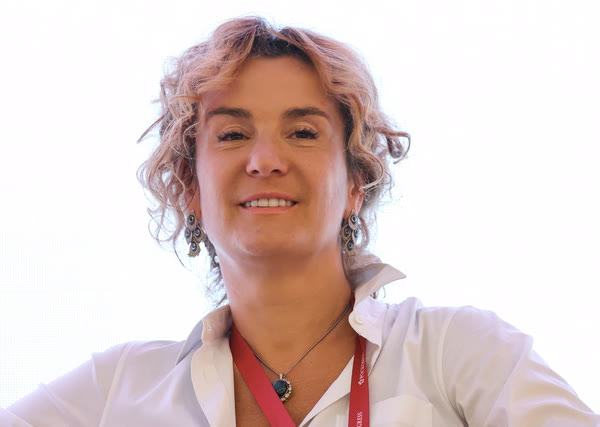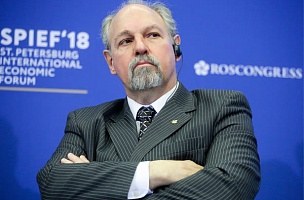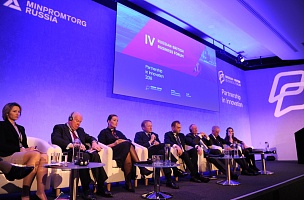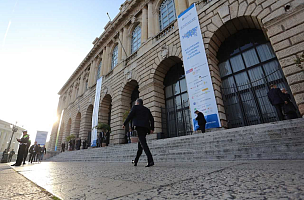KEY CONCLUSIONS
Content created for different platforms needs to be more integrated
“The most important thing, what I consider the know-how of our holding is, if you will, a wheel of Saṃsāra: when our production comes up with content, it appears on platforms, it appears on television. From television, it migrates to the platforms, and from the platforms it migrates to television – the most popular programmes and shows. Accordingly, we include maximum monetization, quick amortization, and an emphasis on our own content,” Alexander Zharov, CEO, Gazprom Media Holding.
“Over the past two years, we have made an incredible leap forward in terms of the absolute integration of different environments. It is really quite difficult to talk about where content is primarily consumed these days,” Svetlana Balanova, CEO, National Media Group.
“We realized that the future really lies in multi-formats. At the time, we did not have the technology. Now we have created it. And we are talking about it for the first time. We are going to create a new kind of media format that combines communication within a group media call. It will feature interactive elements and will contain the ability to influence what is happening on the air and create content together with the author,” Marina Krasnova, CEO, VKontakte.
“We have talked to the Ministry of Culture about offering our proteges an opportunity to have a proper theatrical release. But in my opinion, if we are talking about big projects, it is up to the producers in the first place to decide whether they want it or not. In this situation we have no influence on them,” Elena Lapina, Executive Director, Internet Development Institute.
PROBLEMS
Lack of reliable popularity measurement system and missing cross-platform demand for content
“There are no reliable official measurements in our country [of the popularity and demand for content. – Ed.] The industry, the Internet industry, the television industry, the platforms, they should get together and say: "Let us zero in, there is different technology out there. Let us choose one, and there are people out there – let us choose the right people. Let them, under the supervision of industry representatives, build a functioning system,” Konstantin Ernst, General Director, Channel 1.
“Unified Internet measurement system is about to [materialize. — Ed.],” Elena Lapina, Executive Director, Internet Development Institute.
“I have spoken many times at various meetings about how to measure our national cinema and government subsidies spent on it. And I have always advocated that the measurements should include figures for so-called piracy or uncontrolled Internet viewing. Because it seems to me that the point of government subsidies is to support filmmaking, or in this case visual content, so that fellow citizens can watch this product. And if we measure by the number of tickets sold, by some kind of ratings, by the some kind of cumulative rankings and stuff like that, that is always going to be very narrow,” Dzhanik Faisiev, General Producer, Okko.
“The measurement system of both platforms and TV channels is really obsolete. It needs to be updated,” Danila Sharapov, CEO, Mediaslovo.
Loss of international markets due to sanctions
“The most tangible blow to the industry is the loss of international sales. Soyuzmultfilm will lose 30% of its revenue this year due to the fact that the signed deals will not take place and international contracts will not be paid. This, of course, is a big challenge,” Yulianna Slasheva, Chariperson of the Board, Soyuzmultfilm, CEO, Gorky Film Studio, Chairperson of the Animated Film Association.
“In recent years, decades, the best professionals, best directors have been looking towards the Western markets. The measure of success for many was greater success abroad, and in the West, rather than here in Russia, in Yekaterinburg or in the Far East. However, mental restructuring of the most talented and creative people that success should be local – that is already starting to happen now,” Danila Sharapov, CEO, Mediaslovo.
SOLUTIONS
Raising the quality of content and expanding the share of exclusive product
“The main thing we are betting on is a significant number of originals [exclusive content. – Ed.]. If there were 14 offerings in 2021, this year there will be almost twice as many. Next year we plan to release at least two premieres a month. In general, we are aiming for four, and I hope we will have enough money for it. Losing advertising revenue, on which all the media companies subsist, is a very serious factor at the moment. We are forming a large library and are working in collaboration with our colleagues,” Alexander Zharov, CEO, Gazprom Media Holding.
“The time a user spends online consuming content has grown to an average of 45 minutes. Those are huge numbers. It continues to grow despite seasonality. <...> Everyone loves video. And massive growth was demonstrated by short vertical videos. If you compare it with the last year it is like a fairy-tale. The growth is 2.5 times, but not only in watching, but most importantly in the creation of content,” Marina Krasnova, CEO, VKontakte.
“We put out 200 episodes a year now. Soyuzmultfilm will put out 200 episodes of different animated series this year, 15 parallel pipelines [a document visualizing the product development process. – Ed.] series and five feature films in development. This is a huge pace compared to the industry five years ago,” Yulianna Slasheva, Chariperson of the Board, Soyuzmultfilm, CEO, Gorky Film Studio, Chairperson of the Animated Film Association.
Accessing new foreign markets
“We, our animation is focusing on entering the markets of Southeast Asia, where we were [slightly. – Ed.] underrepresented,” Yulianna Slasheva, Chariperson of the Board, Soyuzmultfilm, CEO, Gorky Film Studio, Chairperson of the Animated Film Association
“It is great that we have reached the point today where we can work together with platforms like Okko, IVI, Start, Kinopoisk, and promote our content abroad. <...> We have already launched Russian Film Week in Kyrgyzstan, today we are launching one is Azerbaijan offline. <...> In Vietnam as well, there is an offline part where our company was present, and it will continue [the event] online,” Inna Shalito, CEO, Roskino.
“We do say that there are markets for us. Certainly, I hope that there will be a demand for our content in these markets. And we will buy there, too. Maybe things that once seemed exotic now are completely acceptable, they have found their viewers. I mean, for example, Turkish or Korean series,” Dmitry Granov, CEO, more.tv
For more information, visit the Roscongress Foundation’s Information and Analytical System roscongress.org.






